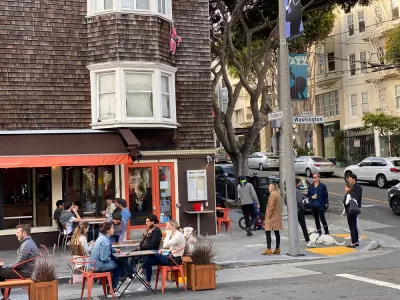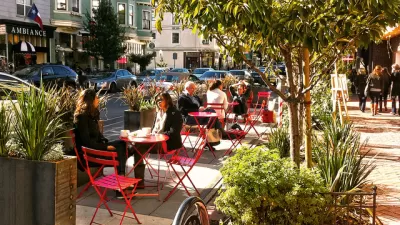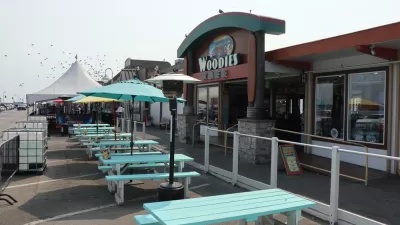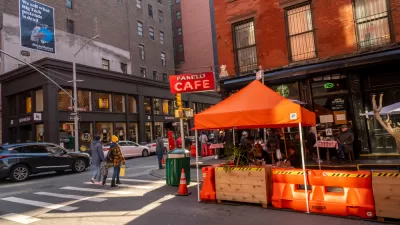Outdoor dining programs are proving popular in cities all over the United States, as a lifeline for both restaurants and residents seeking some social normalcy. Data from San Francisco reveal the numbers behind the phenomenon.

"What a difference a pandemic makes," writes Eve Batey of the changing landscape of business in San Francisco during the pandemic.
"Today, you can’t drive down a business district street in San Francisco without running into a shared spaces platform (SSP). That’s the technical term for the dining areas restaurants have set up in former parking places, private, built-out operations that allow the struggling industry to serve diners reluctant to move indoors."
Although the SSP program is scheduled to expire at the end of the year, Batey reports that the San Francisco Board of Superiors are likely to extend the program, as are a growing list of cities with similar programs around the country, including Philadelphia and New York City.
Given that the SSP program isn't going anywhere any time soon, Batey takes a look at the numbers behind this massive change in the public realm, accounting for both the scale of the change and the cost. For instance, Batey reports that costs for SSP's range from $5,000 for an SSP in the Richmond District to $20,000 for the SSP at a location in Cole Valley.
FULL STORY: Restaurants Are Paying $20,000 (or More) So You Can Dine in the Street

Maui's Vacation Rental Debate Turns Ugly
Verbal attacks, misinformation campaigns and fistfights plague a high-stakes debate to convert thousands of vacation rentals into long-term housing.

Planetizen Federal Action Tracker
A weekly monitor of how Trump’s orders and actions are impacting planners and planning in America.

In Urban Planning, AI Prompting Could be the New Design Thinking
Creativity has long been key to great urban design. What if we see AI as our new creative partner?

Cal Fire Chatbot Fails to Answer Basic Questions
An AI chatbot designed to provide information about wildfires can’t answer questions about evacuation orders, among other problems.

What Happens if Trump Kills Section 8?
The Trump admin aims to slash federal rental aid by nearly half and shift distribution to states. Experts warn this could spike homelessness and destabilize communities nationwide.

Sean Duffy Targets Rainbow Crosswalks in Road Safety Efforts
Despite evidence that colorful crosswalks actually improve intersection safety — and the lack of almost any crosswalks at all on the nation’s most dangerous arterial roads — U.S. Transportation Secretary Duffy is calling on states to remove them.
Urban Design for Planners 1: Software Tools
This six-course series explores essential urban design concepts using open source software and equips planners with the tools they need to participate fully in the urban design process.
Planning for Universal Design
Learn the tools for implementing Universal Design in planning regulations.
Appalachian Highlands Housing Partners
Gallatin County Department of Planning & Community Development
Heyer Gruel & Associates PA
Mpact (founded as Rail~Volution)
City of Camden Redevelopment Agency
City of Astoria
City of Portland
City of Laramie





























